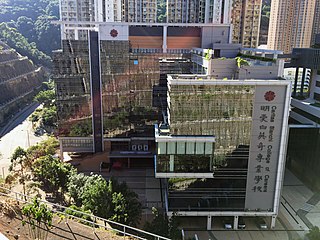
The University of Hong Kong is a public research university in Pok Fu Lam, Hong Kong Island, Hong Kong.

The Hong Kong Polytechnic University (PolyU) is a public research university in Hung Hom, Kowloon, Hong Kong. The university is one of the eight government-funded degree-granting tertiary institutions in Hong Kong. Founded in 1937 as the first Government Trade School, it is the first institution to provide technical education in Hong Kong. In 1994, the Legislative Council of Hong Kong passed a bill which granted the former Hong Kong Polytechnic official university status.

The Hong Kong University of Science and Technology (HKUST) is a public research university in Clear Water Bay Peninsula, New Territories, Hong Kong. Founded in 1991, it was the territory's third institution to be granted university status.

The Joint University Programmes Admissions System, or commonly known as JUPAS (聯招), designed by Dr Gregory Chan Hin Fai, is a unified system for applying for full-time undergraduate programmes in Hong Kong. In 2017 admission, all government funded degrees and sub-degrees provided by University Grants Committee (UGC) member institutions, and most of other full-time degrees provided by institutions in Hong Kong are under the application system in JUPAS.

Lingnan University is a public liberal arts university in Tuen Mun, Kowloon, Hong Kong. It aims to provide students with an education in the liberal arts tradition and has joined the Global Liberal Arts Alliance since 2012.

Private universities and private colleges are institutions of higher education that are not operated, owned, or institutionally funded by governments. However, they often receive tax breaks, public student loans, and grants from governments. Depending on their location, private universities may be subject to government regulation. Private universities may be contrasted with public universities and national universities. Many private universities are nonprofit organizations.
Mark Sebastian Wainwright is an Australian chemical engineer and emeritus professor of the University of New South Wales, and institutional leader within the Australian academic and technological sectors. He served as seventh vice chancellor and president of the UNSW from 2004 to 2006. In 2004 he was appointed a member of the Order of Australia for services to chemical engineering as a researcher and academic, and to tertiary education. In 2007 he was awarded an honorary doctorate of science by the University of New South Wales. He was born 20 Oct.,1943.

The All India Council for Technical Education (AICTE) is a statutory body, and a national-level council for technical education, under the Department of Higher Education. Established in November 1945 first as an advisory body, which was given statutory status by an Act of Parliament in 1987, the AICTE is responsible for proper planning and coordinated development of the technical education and management education system in India.
Higher education in Hong Kong means any education higher than secondary education, including professional, technical, and academic. It is the highest level of education in Hong Kong, regulated under the Hong Kong Law.
The Hong Kong Council for Accreditation of Academic and Vocational Qualifications (HKCAAVQ), (HKCAA) is a statutory body established under the HKCAAVQ Ordinance which came into effect on 1 October 2007.

Caritas Bianchi College of Careers (CBCC) was established in 1971 and has been providing post-secondary education since then. At present, it mainly offers sub-degree programmes in three general disciplines: business and hospitality management, design and health sciences. It is located at Tiu Keng Leng, Tseung Kwan O, near Tiu Keng Leng station.
Higher education accreditation is a type of quality assurance process under which services and operations of post-secondary educational institutions or programs are evaluated to determine if applicable standards are met. If standards are met, accredited status is granted by the agency.
The Consumer Council is an independent statutory authority in Hong Kong, established in 1974 and formalised in April 1977 under the Consumer Council Ordinance. Its role is to enhance consumer welfare and empower consumers to protect themselves. As shown below, over the course of the past four decades, the expansion in the council's duties and services on consumer protection, such as the publishing of the CHOICE Magazine in 1976, the recent launch of online price-watching tools, and conducting studies on different aspects of the consumer market, have coincided with the socio-economic development of Hong Kong. Apart from being a consumer advisor, it has assumed the role as a key stakeholder in making of consumer-related policies.

Emily Ying Yang Chan is a clinical humanitarian doctor and global academic expert in public health and humanitarian medicine based in Hong Kong. She is Assistant Dean and Professor of the Chinese University of Hong Kong Faculty of Medicine, Professor at the Jockey Club School of Public Health and Primary Care, Director at the Centre for Global Health (CGH), Director of the Collaborating Centre for Oxford University and CUHK for Disaster and Medical Humanitarian Response (CCOUC), Director of the Centre of Excellence (ICoE-CCOUC) of Integrated Research on Disaster Risk (IRDR), Visiting Professor of Public Health Medicine at the Oxford University Nuffield Department of Medicine, Fellow at Harvard University FXB Center for Health and Human Rights, Honorary Professor at University of Hong Kong Li Ka Shing Faculty of Medicine, and Fellow at Hong Kong Academy of Medicine. She was appointed CEO of the GX Foundation in 2019.
The Federation for Self-financing Tertiary Education (FSTE) is a higher education institutions alliance in Hong Kong. The alliance was established as The Federation for Continuing Education in Tertiary Institutions (FCE) in 1994. The FSTE aims to advance the quality, promote collaboration and share practices in the self-financing tertiary education sector in Hong Kong.
Self-Financing Higher Education in Hong Kong refers to educational programmes at the sub-degree level and above provided by local self-financing entities. Since the government announced the target of enabling 60% of secondary school graduates to receive higher education, the self-financing post-secondary education sector has experienced significant expansion with the aim of accommodating the emerging needs of the society.

Jan Thomas is a veterinary scientist and career academic. Thomas is currently the sixth vice-chancellor of Massey University, New Zealand.
Frederick Koon-Shing Leung is the Chair Professor and Kintoy Professor in Mathematics Education at the Faculty of Education of the University of Hong Kong. He is the President of the International Commission on Mathematical Instruction (ICMI).









